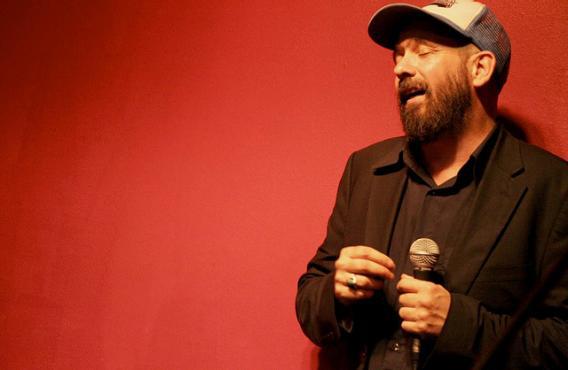In another era, Mark Eitzel was known as one of the best songwriters of his generation. His band, American Music Club, released a series of twangy, depressing albums in a genre perhaps best described as “Sadamericana.” They provided both the soundtrack and solace for the mopiest moments of my adolescence.
A couple-odd decades later, Eitzel is 53 years old, and a bit more than a year removed from a heart attack. He never became a star. He says he’s totally broke. His latest album, Don’t Be a Stranger—which is getting some of the best reviews of his solo career—only became possible after a friend who’d won the lottery decided to help him out with some funding.
Every time I put that new album on, I’m instantly back in my cinderblock-lined college dorm room as though no time has passed. When I saw that Eitzel was coming through New York on tour in support of the record, I couldn’t resist trying to meet him. And so yesterday I bought him coffee and sat with him outside on a Brooklyn stoop in the winter afternoon. Eitzel in conversation is a lot like Eitzel in song: dark and gloomy, laced with self-hatred, but ultimately awed by the small hope that he might find something beautiful in life’s wreckage.
Can he still make a living in music? No. “If you have ambitions that are in any way vocational,” he says, “your work becomes free stuff that people can use on the internet.” Despite his best efforts, he hasn’t been able to remove his songs from streaming sites, which, as others have explained at greater length, pay him almost no money. “When someone tells me they’re quitting music these days I say, ‘Right on, well fucking done.’ ”
Still, he says he can’t stop writing songs, and writes more now than he ever has. And he’s freer in some ways. He was in the closet at the peak of his success, but these days he openly moons over his boyfriend of three years. “It sounds completely lame and pathetic to even consider the closet now,” says Eitzel. “But at the time, if you came out with a gay love song, it’s not a love song, it’s a political act. I didn’t want to come out of the closet and not be able to write anymore, or feel I couldn’t tour and front my band without shaming them. Now I’m old and ugly and over and I don’t care.”
Aging has made songwriting more difficult in some ways, though, mainly because Eitzel now “knows shit” about life he didn’t know before. “That gets in the way. The only thing people want to hear in a song is the mystery of trying to solve an unknown thing. I’ve had about three unknown things my whole life, and I’ve been dancing around those three. I haven’t figured them out yet. When I figure them out I’ll be peaceful in my mind and I won’t have to fuckin’ do this anymore.”
“I don’t believe in the future, it’s all going to shit,” he sings on the new record. “But I thought we could still put on a show.” It might as well be his motto. At the Highline Ballroom last night, he did put on a show, and it was wonderful. He’s at last succumbed to his destiny as a crooner—he stumbles around the stage alone, microphone in hand, accompanied only by a pianist off to one side. His voice is lower than it used to be, but those full-body wails that seem to start at his toes are as strong and transporting as ever. He apologized several times, repeatedly called himself “bullshit,” and occasionally seemed to be overcome by emotion. For fans, this is not new: It’s vintage Eitzel. Go see him when he comes to your city, and buy his new album, so that he can keep on doing this thing that, whatever he may say, he is so clearly meant to do.
